
Kishore Kumar was an Indian playback singer, musician and actor. He is widely regarded as one of the greatest, most influential and dynamic singers in the history of Indian music. Kumar was one of the most popular singers in the Indian subcontinent, notable for his yodelling and ability to sing songs in different voices. He used to sing in different genres but some of his rare compositions, considered classics, were lost in time.

Rajesh Khanna was an Indian actor, film producer and politician who worked in Hindi films. Considered as one of the greatest and most successful actors in the history of Indian cinema, he is known as the first Superstar of Indian cinema. He has consecutively starred in a record 15 solo hero successful films between 1969 and 1971. He was the highest-paid actor in Hindi cinema throughout the 1970s and 1980s. His accolades include five Filmfare Awards, and in 2013, he was posthumously awarded the Padma Bhushan, India's third highest civilian honour.

Hrishikesh Mukherjee was an Indian film director, editor and writer. He is regarded as one of the greatest filmmakers of Indian cinema. Popularly known as Hrishi-da, he directed 42 films during his career spanning over four decades, and is named the pioneer of the 'middle cinema' of India. Renowned for his social films that reflected the changing middle-class ethos, Mukherjee "carved a middle path between the extravagance of mainstream cinema and the stark realism of art cinema".
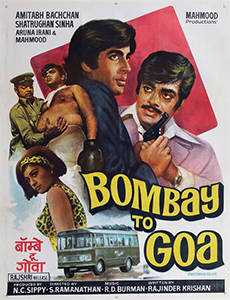
Bombay to Goa is a 1972 Indian Hindi-language road comedy film directed by S. Ramanathan and produced by Mehmood and N. C. Sippy. Released in India on 3 March 1972, the film stars Amitabh Bachchan, Aruna Irani, Shatrughan Sinha, Nazir Hussain, Mehmood and Anwar Ali in lead roles. The film is known particularly for its catchy tunes and was a "superhit" at the box office. The film is a remake of a 1966 hit Tamil film Madras to Pondicherry and was remade in Kannada in 2007 as Ekadantha. The Hindu had reported that Rajiv Gandhi was offered the lead role by Mehmood but he had turned it down.
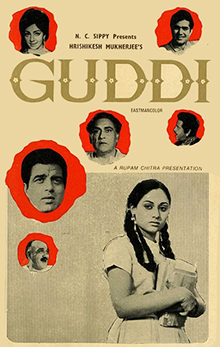
Guddi is a 1971 Indian Hindi drama film directed by Hrishikesh Mukherjee and written by Gulzar. It starred Dharmendra, Jaya Bachchan and Utpal Dutt. It is Jaya Bachchan 's career-making film in which she plays a schoolgirl who has a crush on and is obsessed with the actor Dharmendra, who plays himself. She earned a Filmfare nomination as Best Actress, the only nomination for the film. Utpal Dutt also has a starring role. Many Bollywood actors like Rajesh Khanna, Naveen Nischol, Asrani, Amitabh Bachchan, Vinod Khanna, Om Prakash and Pran gave guest appearances as themselves. According to Boxofficeindia.com, the film became a "big city hit" and did "above average" business everywhere else. It was later remade in Tamil as Cinema Paithiyam (1975) starring Jayachitra and Jayasankar.
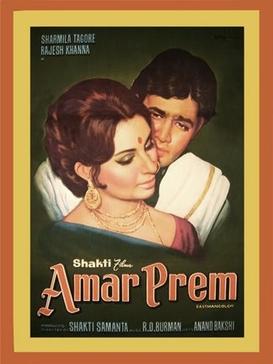
Amar Prem is a 1972 Indian Hindi romantic drama film directed by Shakti Samanta. It is a remake of the Bengali film Nishi Padma (1970), directed by Arabinda Mukherjee, who wrote screenplay for both the films based on the Bengali short story Hinger Kochuri by Bibhutibhushan Bandopadhyay. The film portrays the decline of human values and relationships and contrasts it by presenting an illustrious example of a boy's innocent love for a neighbourhood tawaif(courtesan). The movie is about a school boy, who is ill-treated by his step mother, and becomes friends with a courtesan neighbour. The film stars Sharmila Tagore playing a Hooker with a heart of gold, with Rajesh Khanna in the role of a lonely businessman and Vinod Mehra as adult Nandu, the young child, who they both come to care for.

Khud-Daar (transl. Self-Respecting) is a 1982 Indian Hindi-language action film directed by Ravi Tandon. The music is by Rajesh Roshan and the lyrics by Majrooh Sultanpuri. The film stars Amitabh Bachchan, Sanjeev Kumar, Parveen Babi, Vinod Mehra, Prem Chopra, Mehmood, Bindiya Goswami and Tanuja in pivotal roles. It was remade in Tamil as Padikkadhavan and in Telugu as Driver Babu.
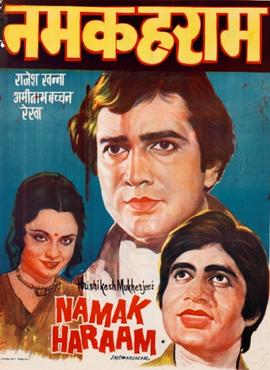
Namak Haraam (transl. Traitor) is a 1973 Indian Hindi-language drama film directed by Hrishikesh Mukherjee. The music is by R.D. Burman, the screenplay by Gulzar, and lyrics by Anand Bakshi. The film stars Rajesh Khanna and Amitabh Bachchan. It also stars Rekha, Asrani, Raza Murad, A. K. Hangal, Simi Garewal and Om Shivpuri. Rajesh Khanna received his third BFJA Awards for Best Actor (Hindi) in 1974 for this film and Amitabh Bachchan had won his second Filmfare Award for Best Supporting Actor in 1974.
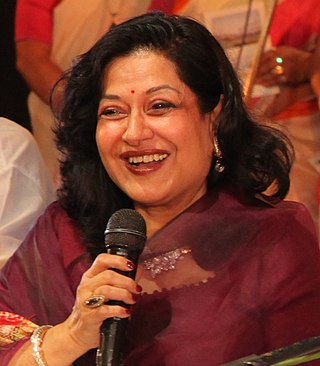
Moushumi Chatterjee is an Indian actress who is recognised for her work in Hindi cinema as well as Bengali cinema. She was one of the highest paid actresses in Hindi films during the 1970s. She joined the Bharatiya Janata Party in 2019.

Bawarchi is a 1972 Indian Hindi-language musical comedy drama film directed by Hrishikesh Mukherjee and produced by Mukherjee himself along with N.C. Sippy and Romu N. Sippy. Released in India on 7 July 1972, the film stars an ensemble cast of Rajesh Khanna, Jaya Bhaduri, Asrani, Harindranath Chattopadhyay, A.K. Hangal, Durga Khote, Manisha, Kali Banerjee, Usha Kiran and Raju Shrestha. The film was a remake of Rabi Ghosh starrer Bengali film Galpo Holeo Satti (1966) by Tapan Sinha. The film was ranked the eight highest-grossing film of the year 1972. In an interview, Khanna quoted "In Bawarchi, I did exactly the opposite of what Hrishida had made me do in Anand (1971). He allowed me to interpret the role and perform my way. I had done enough intense roles, and Bawarchi gave me the opportunity to interpret and perform the role the way I wanted. So I let myself go."

Bemisal is a 1982 drama film produced by Debesh Gosh and directed by Hrishikesh Mukherjee. It is a remake of Uttam Kumar's Bengali classic Ami Se O Shakha (1975), which was also based on the Bengali story of the same name by Ashutosh Mukherjee.The film stars Amitabh Bachchan, Vinod Mehra, Raakhee, Deven Verma, Aruna Irani and Om Shivpuri. The music was by R.D. Burman.

Lootmaar (transl. Depredator) is a 1980 Hindi mystery film produced and directed by Dev Anand. The film stars Dev Anand, Tina Munim, Mehmood, Nirupa Roy, Prem Chopra, Ranjeet, Shakti Kapoor, Kader Khan, Amjad Khan, Simple Kapadia, Shreeram Lagoo and Rakhee Gulzar in a Guest appearance. The film's music was composed by Rajesh Roshan.
The 28th Filmfare Awards were held in 1981.
The 27th Filmfare Awards were held in 1980.
The 23rd Filmfare Awards were held on March 30, 1976.
The 21st Filmfare Awards were held in 1974.
The 19th Filmfare Awards were held in 1972, honoring the best in Hindi films in the year 1971.











